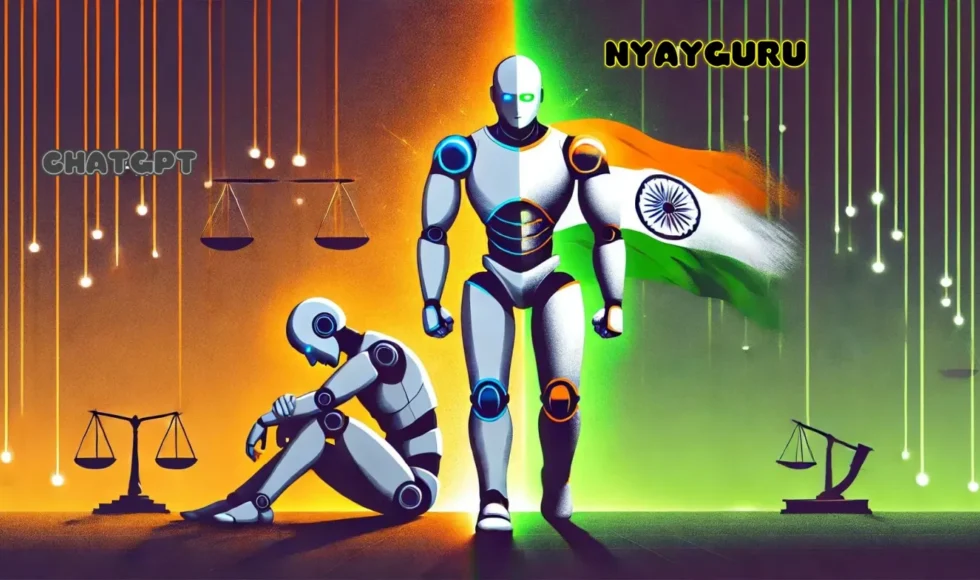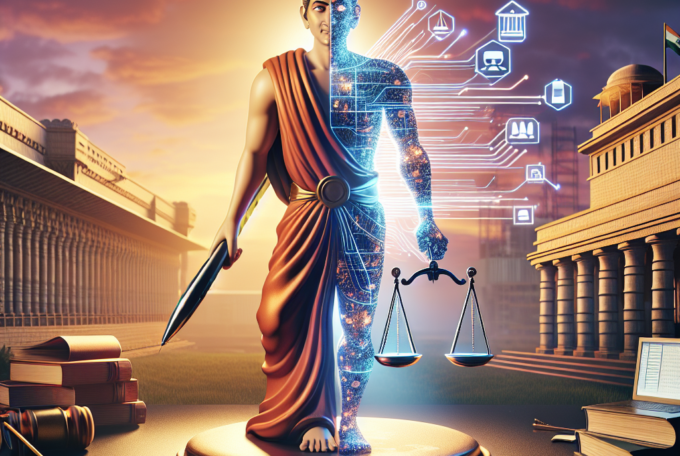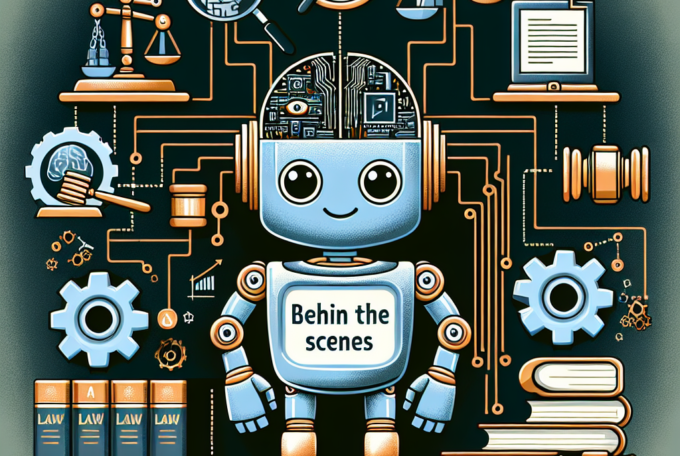The Rise of AI in Legal Assistance
Artificial Intelligence (AI) is transforming industries worldwide, and the legal field is no exception. With tools like NyayGuru and ChatGPT, individuals now have access to AI-driven assistance that promises to make legal queries simpler, faster, and more accessible. But how do these two platforms compare when it comes to legal assistance? This article delves into the capabilities, strengths, and limitations of NyayGuru and ChatGPT, highlighting why NyayGuru is the go-to solution for Indian legal queries.
What is NyayGuru?
NyayGuru is India’s first AI-powered legal chatbot, developed by Brainwave Technologies. Designed specifically to address Indian legal queries, NyayGuru provides free legal assistance tailored to the country’s laws, acts, and judicial precedents. It focuses on delivering precise, localized, and practical legal advice to users in a user-friendly format.
What is ChatGPT?
ChatGPT, developed by OpenAI, is a versatile AI language model designed to answer a broad range of queries. While it is highly capable in general knowledge and conversational tasks, its legal expertise is not jurisdiction-specific, making it less effective for users seeking detailed and accurate legal guidance in India.
Key Features: NyayGuru vs. ChatGPT
1. Focus on Indian Laws
NyayGuru is exclusively trained on Indian legal texts, including acts, statutes, and case laws, ensuring high accuracy and relevance for Indian users. ChatGPT, on the other hand, lacks a dedicated focus on Indian laws, leading to generic or incomplete responses to legal queries.
2. Accuracy and Reliability
NyayGuru’s database and algorithms are designed to provide legally sound and precise answers. For example:
- If a user asks about divorce laws in India, NyayGuru references the Hindu Marriage Act or other applicable laws with direct guidance.
- ChatGPT might offer a generalized response without citing specific legal provisions.
3. User-Friendliness
NyayGuru is built to simplify complex legal concepts for laypersons. Its intuitive interface ensures that users can get answers without needing to frame their queries in complex legal language. ChatGPT, while versatile, requires users to provide well-structured questions for accurate responses.
4. Confidentiality
Legal queries often involve sensitive information. NyayGuru prioritizes user privacy, ensuring secure and confidential interactions. ChatGPT lacks dedicated privacy features for legal assistance, potentially raising concerns for users handling sensitive cases.
Detailed Comparison: NyayGuru vs. ChatGPT
| Feature/Aspect | NyayGuru | ChatGPT |
|---|---|---|
| Purpose | Specifically designed as an AI LawBot for Indian laws. | General-purpose AI language model for a wide range of topics. |
| Legal Expertise | Trained exclusively on Indian laws, acts, and judicial precedents. | Limited understanding of Indian laws; lacks specialized legal training. |
| Target Audience | Indian users seeking free legal advice and assistance. | General audience across various domains and topics. |
| Accuracy in Legal Context | High accuracy for Indian legal queries due to a focused database. | Can provide basic legal explanations but may lack accuracy or specificity in Indian legal contexts. |
| Customization | Tailored responses specific to Indian legal needs and scenarios. | Generic responses not tailored to specific legal systems or jurisdictions. |
| User Experience | User-friendly interface with simple legal explanations for laypersons. | Requires users to phrase questions carefully for accurate answers; not specialized for legal contexts. |
| Cost | Free legal assistance for all users. | Paid subscription required for advanced features (ChatGPT Plus). |
| Confidentiality | Focuses on secure, private legal advice. | No specific confidentiality focus for legal queries. |
| Availability of Indian Case Laws | Provides insights directly from Indian legal frameworks and precedents. | Does not access or provide case-specific details from Indian laws. |
| Focus on Local Relevance | Exclusively focused on Indian legal scenarios and cultural nuances. | Lacks local contextual relevance; more suited for general international use. |
| Ease of Access | Specifically designed for straightforward legal queries. | Versatile but requires effort to extract useful legal information. |
| Learning Capability | Continuously updated with changes in Indian laws and regulations. | General updates but not specific to Indian legal developments. |
| Examples and Practical Guidance | Offers detailed examples and practical steps tailored to Indian laws. | Can provide theoretical explanations but lacks practical guidance for specific jurisdictions. |
| Pro Bono Focus | Aims to democratize legal access in India with free advice. | Not specifically designed for legal aid or pro bono initiatives. |
| Support for Niche Areas | Covers diverse Indian legal areas like family law, criminal law, property law, etc. | May not have sufficient depth in niche Indian legal areas. |
| Development Team | Built by Brainwave Technologies with a specific focus on Indian law. | Developed by OpenAI as a broad AI model for various applications. |
| Expansion Potential | Designed to scale with additional legal features and functionalities. | Generic AI with no specific roadmap for Indian legal enhancements. |
Examples of Legal Assistance
NyayGuru’s Expertise
i) Case Study 1: “Can a divorced woman claim maintenance if she remarries but later divorces her second husband? What legal precedents support this?”
NyayGuru: NyayGuru provides a nuanced explanation based on Section 125 of the Code of Criminal Procedure (CrPC) and explains the conditions under which maintenance claims can be made after a second divorce. It cites relevant case laws such as Vanamala v. H.M. Ranganatha Bhatta (1995), where the Supreme Court discussed the nuances of maintenance in post-divorce scenarios, and provides advice on how to establish eligibility based on financial dependency and other criteria.
ChatGPT: ChatGPT might explain that a divorced woman can claim maintenance under Section 125 CrPC, but it may not delve into the intricacies of remarriage and second divorce scenarios. It is unlikely to provide case law references or practical advice.
ii) Case Study 2: “What are the limitations for filing a partition suit for ancestral property, and can a delayed claim be accepted based on fraud?”
NyayGuru: NyayGuru explains the concept of limitation periods under the Limitation Act, 1963, specifically the 12-year period for filing property suits. It goes further to discuss exceptions under Section 17 of the Limitation Act, which allows extension due to fraud. It cites judgments like P. Sarojini Amma v. Velayudhan Pillai (2019) to illustrate how courts interpret fraudulent concealment in ancestral property disputes.
ChatGPT: ChatGPT could explain the basic limitation period for property suits under the Limitation Act but may not address specific exceptions like fraud or provide relevant case precedents.
iii) Case Study 3: “What legal remedies are available if an employer fails to deposit EPF contributions despite deductions? Can criminal action be initiated?”
NyayGuru: NyayGuru breaks down the legal provisions under the Employees’ Provident Funds and Miscellaneous Provisions Act, 1952. It explains how non-compliance constitutes a criminal offense under Section 14 of the Act and advises filing a complaint with the EPFO. Additionally, it references judgments like Harpal Singh v. State of Punjab (2005), where employers were penalized for similar violations, and outlines steps to initiate criminal proceedings.
ChatGPT: ChatGPT might outline that non-deposit of EPF contributions is illegal but may not reference the specific provisions under the Employees’ Provident Funds Act or explain how criminal action can be pursued, leaving the user with incomplete guidance.
Key Takeaway
As you can see, NyayGuru excels in handling intricate legal scenarios, offering case-specific advice, citing legal precedents, and providing actionable steps. ChatGPT, though capable of explaining general legal principles, often lacks the depth, specificity, and practical guidance that complex legal queries require.
Why NyayGuru is Superior for Indian Users
1. Tailored Legal Assistance
NyayGuru’s responses are curated for Indian laws, making it a highly reliable tool for users navigating the country’s legal system.
2. Free Access
While ChatGPT requires a subscription for advanced features, NyayGuru offers its services entirely free, ensuring accessibility for all.
3. Constant Updates
NyayGuru is continuously updated with the latest changes in Indian laws and regulations, keeping it relevant and accurate. ChatGPT’s updates are not tailored to Indian legal developments.
4. Localized Focus
NyayGuru understands cultural and regional nuances that impact legal interpretations in India, offering advice grounded in local contexts.
Future Potential of NyayGuru
While NyayGuru already excels in providing legal assistance, its roadmap includes expanding features like legal drafting, case law searches, and client management tools. These additions aim to make NyayGuru a one-stop solution for legal needs in India, further widening the gap between it and general-purpose AI like ChatGPT.
Choosing the Right AI for Legal Queries
When it comes to Indian legal assistance, NyayGuru emerges as the clear winner. Its dedicated focus, high accuracy, and user-friendly interface make it the ideal choice for individuals seeking reliable legal guidance. ChatGPT, while excellent for general queries, cannot match the specialization and precision NyayGuru offers in the legal domain. For Indian users, the decision is straightforward: NyayGuru is the ultimate tool for navigating the complexities of the country’s legal landscape.



